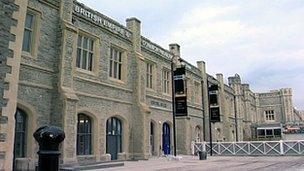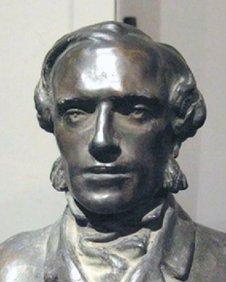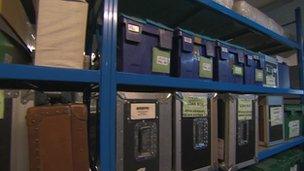Items 'missing' from British Empire and Commonwealth Museum
- Published

British Empire and Commonwealth Museum in Bristol closed in 2008
More than 140 items that were lent to a museum which has since closed are missing, the BBC has learned.
They belong to eight lenders and were under the care of the British Empire and Commonwealth Museum in Bristol.
The museum's trustees have declined to say what the items are other than they do not belong to charities.
But the BBC's Inside Out West has found that one item lent to the museum, a 19th Century painting, was sold in 2008 without the owner's knowledge.
The museum closed in the same year and a move to London was cancelled because of the credit crunch.
Full audit
Bristol City Council is now in charge of the museum's exhibits and said it would display some of them alongside its other collections.
The council said it could not say how many items were missing as it did not have a full audit allowing it to compare the collection now with what was there before it took it over.
However, the museum's trustees said 144 loan items were still un-accounted for.
The BBC's Inside Out West has discovered that in 2008, a painting of a 19th Century trading ship, the Dunira, was sold at auction for more than £61,000 without the owner's knowledge.
The painting belonged to Lord Caldecote, who said his great, great grandfather was the captain of the ship.
He learned that the painting had been loaned to the museum when he was going through his parents' estate.
"I contacted the museum and asked, 'Could we have the painting back?' and unfortunately, they said 'No, this painting was given to the museum', and we subsequently discovered it had been sold by Christies on behalf of the museum," he said.
"And I said 'No, this is not right because we have a document here that clearly shows it was loaned to the museum, not given'."
He added: "I suppose the museum is to blame, because they didn't have a proper stock check and maybe somebody in the museum went, shall we say, off-piste rather than follow all the correct procedures."

A statue of John Robert Godley was gifted to the museum in 2003
The painting was bought by the government of Madeira - the island is pictured in the background - which said it did not know about the connection to the museum or the Caldecotes.
The auction house Christies said all parties were discussing a settlement.
'Vigorously defended'
The British Empire and Commonwealth Museum's latest accounts say its director Gareth Griffiths had undertaken a number of "unauthorised transactions".
He was dismissed in February 2011. Avon and Somerset Police were called in a month later but no-one was arrested or charged.
At the time, Mr Griffiths said any objects were disposed of with the knowledge and agreement of the trustees and that the receipts were fully audited.
Sir Neil Cossons, the chairman of the museum trustees, told the BBC: "Well, that isn't the case."
Mr Griffiths added in 2011 that any suggestion he profited from the disposal would be "vigorously defended".
'No authorisation'
The BBC has also traced several items that went missing from a collection gifted to the museum in 2003 by the former Commonwealth Institute.
One item is a statuette of John Robert Godley, the founder of Christchurch in New Zealand.
In 2010, the Metropolitan Police investigated claims that this statue and other items were being sold by a dealer in London.
The BBC has seen its report, which says the dealer took about 150 items and paid the museum £115,000.
The dealer declined to comment, but has returned some items including the Godley statuette.
The Met concluded this was a civil matter.
Sir Neil said: "There was no authorisation at all of any of the material that went to the London dealer and certainly not of the Dunira painting [which was sold by Christies].
"These are items that went from our possession without the knowledge or the authority of the trustees and a large part of the time the trustees have been spending since our director was dismissed have been trying to get to the bottom of those issues."
Dr Katherine Prior, a former senior researcher at the museum, said: "I helped persuade people to give valuable family collections to the museum, and I was just aghast that we had betrayed our donors in this way and also the people who had backed us financially and had put their neck on the line to support us politically."
Trust's viability
Mr Griffiths told the BBC financial pressures had increased over many years and questioned whether the museum trust had met its responsibilities.

Bristol City Council is now auditing the artefacts
He said the trust's viability and fundraising had to be examined.
He claimed the trust had ceased to provide a public benefit when the trust's focus moved to providing a venue for events.
Sir Neil said the trustees had provided an educational outreach programme.
He added: "I don't believe the trustees are to blame for having their eye off the ball because the role of trustees in a museum like this is to oversee strategy and broad policy and in that sense I think they have been both responsible and conscientious.
"The difficulty is that trustees are not generally speaking in the day-to-day management and operation of the enterprise for which they are trustees.
"And in our case we delegated to a responsible, paid director with some staff and all the indications were that this was a professional doing a professional job."
You can see the full story on BBC Inside Out West at 19:30 GMT on 10 December
- Published28 March 2012